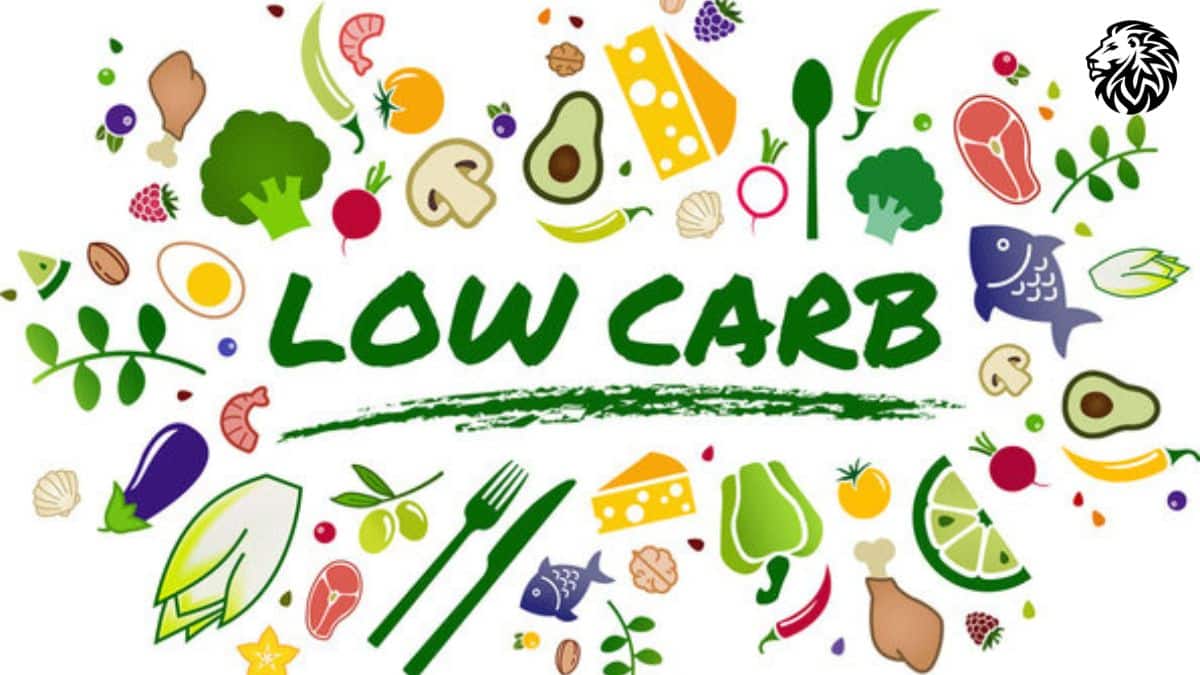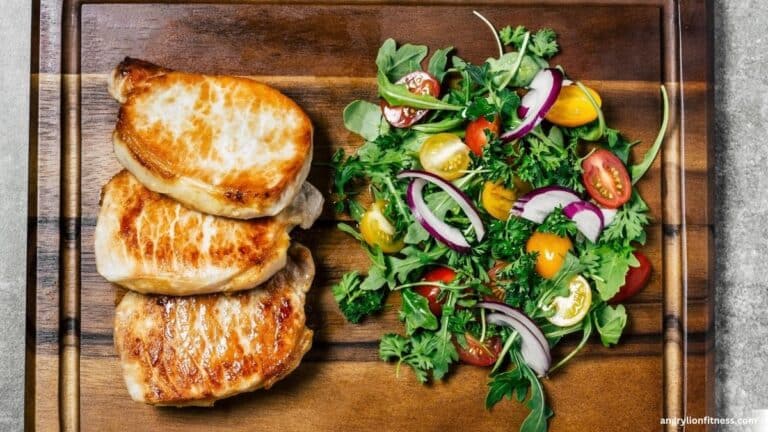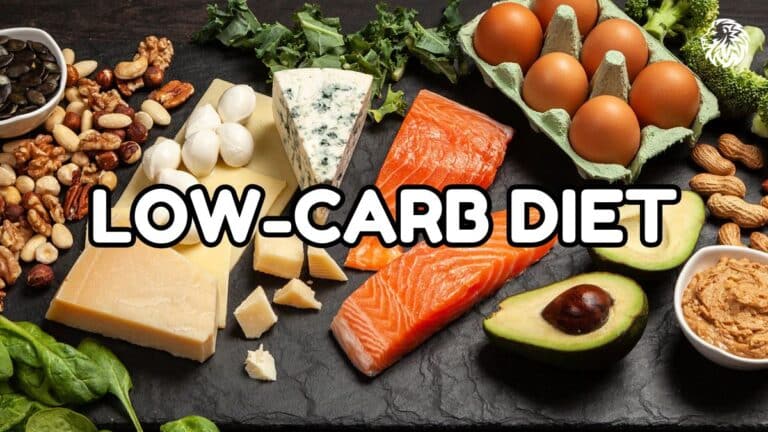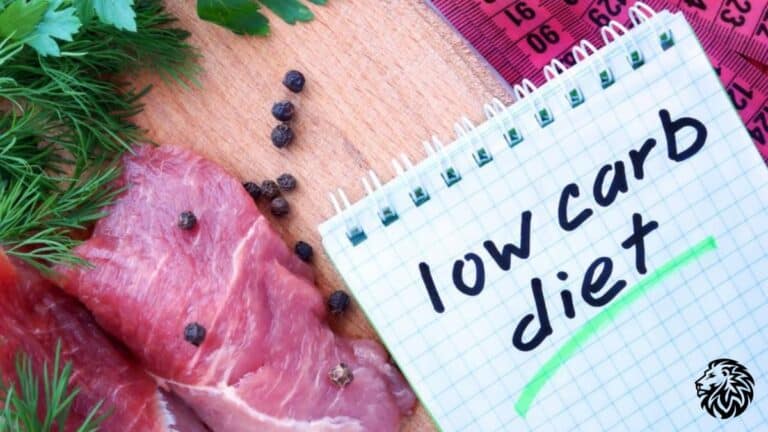Understanding Low-Carb Diets
Basics of Low-Carb Diets
Low-carb diets are all about cutting back on carbs while diving into carbs’ trusty sidekicks: protein and fat. Imagine having less than a quarter of your day’s calories coming from bread, pasta, and sugary treats. For someone munching on 2,000 calories a day, they’d stick to under 130 grams of those tempting carbs. This diet is all about getting your body to turn into a fat-burning machine instead of relying on sugar to power you through.
| Daily Calories | Carbs (g) |
|---|---|
| 2000 | <130 |
| 1500 | <98 |
| 1200 | <78 |
Benefits of Low-Carb Diets
Low-carb diets can sprinkle quite a few benefits your way:
- Weight Loss: Are you looking to drop a few pounds? You’re not alone. Many people find that low-carb diets can help with shedding those stubborn pounds, and some studies even say they might help you lose weight faster than low-fat diets. For weight loss that sticks, combining your new eating habits with some extra activity might be the way to go. Cutting 500 to 750 calories daily could have you losing about 1 to 1.5 pounds a week. It’s about finding that balance in eating and moving.
- Blood Sugar Control: If you’re trying to keep your blood sugar levels steady, a low-carb diet might become your best buddy. It’s particularly helpful if you’re dealing with diabetes or prediabetes because less carbs equals less insulin needed. It’s a straight path to keeping your blood sugar on an even keel.
- GERD Relief: Struggling with GERD (Gastroesophageal Reflux Disease)? Low-carb eating might offer a bit of respite. Cutting those carbs can reduce extra gas and belly pressure—often the culprits behind that annoying heartburn. Research even shows that saying goodbye to simple sugars can really help alleviate those GERD symptoms.
Keen on learning more about what going low-carb can do for you? Check out our deep dive into low-carb diet benefits.
Jumping onto the low-carb train can open doors to a healthier you. And if you’re curious about how this eating style can work wonders on your weight and diabetes management, check out our guides on low carb diet for weight loss and low carb diet and diabetes.
Low-Carb Diets for Acid Reflux
Impact on GERD Symptoms
So, you’ve got acid reflux acting up like a broken record, huh? Maybe you’ll catch a break by trimming down on carbs. Doctors often tip their hats to a low carb diet when dealing with GERD (that’s Gastroesophageal Reflux Disease for us word-whisperers). Why? Lowering carbs can mean fewer carbs left floating around in your gut. This cuts down on all that pesky gas and calms the pressure in your belly.
Now, if you’re carrying a few extra pounds and your body struggles with insulin (we’re talking about you, keto enthusiasts), diving into a high-fat, low-carb setup might just ease those fiery heartburn feelings (Houston Heartburn and Reflux Center). Of course, if your GERD is deep in the trenches, don’t go tossing your prescriptions just yet. Diet alone might not do the whole trick.
Research and Studies
Research points its thumbs up at low carb diets improving GERD symptoms. There was this one study that showed folks who ditched the simple sugars noticed a real difference. The less sugar, the more the primary pH levels seemed to benefit, easing GERD woes. Basically, it’s about steering clear of refined carbs and sticking to the natural goodies.
Feel free to dig into non-starchy veggies, berries, and a few select fruits. You wouldn’t go wrong with some lower-carb picks like lotus root and squash if you’re aiming for that sweet relief from GERD.
| Symptom Improvement | Diet Group |
|---|---|
| Big Time Relief | Low Carb, Less Sugar Brus |
| Okay-ish Relief | Mixed Bag Diets |
| Not Much Relief | Sugar-Loaded Diets |
Be it heartburn or the whole GERD annoyance, going low carb can tone down the digestive drama by cutting down on diet blunders. So, think unrefined foods and peek at our guide for low carb snacks to keep things digestively dandy. And if you need some inspiration, our low carb meal plan and low carb recipes are waiting just for you.
Implementing a Low-Carb Diet
Food Choices on a Low-Carb Diet
When picking foods for a low-carb lifestyle, aim for real, less complicated grub that doesn’t pack in the carbs. Keep things under 130 grams of carbs a day, which shakes out to about a quarter of your calorie intake, give or take (Healthline). Here’s the lowdown on what to pile on your plate:
Proteins:
- Chicken and turkey
- Fish and their ocean buddies
- Eggs – your breakfast superhero
- Beef and pork
Vegetables:
- The leafy kind (spinach, kale)
- Veggies with some crunch (broccoli, cauliflower)
- Bell peppers – like rainbows you can eat
- Zucchini
Fruits (don’t overdo it):
- The berry good ones (strawberries, blueberries)
- Avocado – it’s like butter you grow on trees
Dairy:
- Cheese
- Greek yogurt, but only if it’s not sweetened up
- Cream
Nuts and Seeds:
- Almonds
- Chia seeds
- Walnuts
Fats:
- Olive oil
- Coconut oil
- The kind of butter Paula Deen loves
Beverages:
- Good old water
- Herbal tea
- Coffee (tell sugar to take a hike)
Sure, you can have some higher carb treats like fruits and starchy veggies, just don’t go bananas (Healthline).
Meal Planning for Success
Jumping on a low-carb train takes some decent planning. Here’s a cheat sheet to help map out your meal plans:
Know Your Numbers:
- Figure out your daily carb cap. So, munching 2000 calories a day? Keep carbs under 130 grams.
Pick Your Eats:
- Load up meals with low-carb champs. For snacks, think cheese sticks, nuts, or veggies and dip – your trusty sidekicks.
Be Kitchen Ready:
- Prep your grub before the hangry monster shows. Stock up containers to feed you through the week.
Find Your Balance:
- Pack each meal with enough protein, low-carb veggies, and healthy fats. Keeps you running steady, not drained and grumpy.
Keep Tabs:
- Jot down your eats in a food diary or app. Staying in the zone keeps you good with the carbs.
Here’s a taste of what a low-carb day could look like:
| Meal | Food Items | Carbs (g) |
|---|---|---|
| Breakfast | Omelet starring spinach, cheese, and mushrooms | 5 |
| Snack | Greek yogurt jazzed up with a few berries | 10 |
| Lunch | Grilled chicken salad on a bed of greens | 8 |
| Snack | Crunchy cucumber slices hanging with hummus | 6 |
| Dinner | Baked salmon with broccoli and an avocado cameo | 12 |
This plan’s built to keep carbs low, so you’re full-speed ahead on that low-carb journey.
For more tasty inspiration, check out our low-carb recipes, and keep it up for that sweet, sweet relief from acid reflux.
Managing GERD with Low-Carb Eating
Low-Carb Diet for Weight Loss
Switching to a low-carb diet could be your jackpot for shedding those extra pounds. By cutting down on carbs and amping up healthy fats and proteins, you can nudge your body into burning fat instead of carbs – a cool little process called ketosis. When it clicks, weight loss becomes noticeable pretty fast.
For anyone wrestling with gastroesophageal reflux disease (GERD), slimming down is not just about fitting into your favorite jeans. Extra weight can put pressure on your abdomen and make acid snake back up your esophagus, making reflux worse. Dropping those pounds can take the load off and help lessen those pesky reflux flare-ups.
| Dietary Piece | Suggested Amount |
|---|---|
| Carbs | Less than 20g/day |
| Proteins | Keep it moderate |
| Fats | Go for high |
Need some starting points for low-carb meals? Check out this low carb meal plan.
How Low-Carb Diet Works for Acid Reflux
Recent studies show that low-carb diets can be real game-changers for tackling acid reflux troubles. One particular study found that slashing carbs to less than 20 grams a day significantly cut down on acid exposure and GERD issues for folks with some extra weight. In less than a week, participants noticed big wins:
- The Johnson-DeMeester score took a nosedive from 34.7 to 14.0.
- Time with a pH < 4 in the esophagus cut in half, from 5.1% to 2.5%.
- The GERD Symptom Assessment Scale – Distress Subscale (GSAS-ds) score fell from 1.28 to 0.72. (PubMed)
Another study also showed that dialing down simple sugars, cutting about 62 grams daily, gave GERD symptoms a break. Less sugar means smoother digestion and fewer reflux triggers (Verywell Health).
| Thing Checked | Before | After |
|---|---|---|
| Johnson-DeMeester Score | 34.7 | 14.0 |
| Time with pH < 4 | 5.1% | 2.5% |
| GSAS-ds Score | 1.28 | 0.72 |
Want to include these changes in your eating habits? Peep our guide on the best low carb foods and see the low carb diet benefits.
Focusing on a diet low in simple sugars and carbs can seriously help keep GERD symptoms in check, letting you live comfortably. For more tips, look at our thorough guide on low carb diet for weight loss.
Incorporating Low-Carb Choices
Fruits & Vegetables in Low-Carb Diets
When you’re tackling acid reflux with a low-carb diet, knowing which fruits and veggies to munch on is a game-changer. While all fruits have their perks, a few pack more carbs than others, so eat those sparingly.
Low-Carb Fruits:
- Berries: Blueberries, strawberries, raspberries
- Melons: Cantaloupe, honeydew
- Avocado
| Fruit | Carbs per 100g |
|---|---|
| Blueberries | 14.5g |
| Strawberries | 7.7g |
| Raspberries | 5.4g |
| Cantaloupe | 8.2g |
| Honeydew | 9g |
| Avocado | 1.8g |
Explore our best low carb foods page for the full buffet of options.
Low-Carb Vegetables:
- Leafy Greens: Spinach, kale, arugula
- Cruciferous: Broccoli, cauliflower, Brussels sprouts
- Peppers: Bell peppers, jalapeños
- Others: Zucchini, eggplant
| Vegetable | Carbs per 100g |
|---|---|
| Spinach | 3.6g |
| Kale | 4.4g |
| Broccoli | 7g |
| Cauliflower | 5g |
| Bell Peppers | 6g |
Picking the right mix of fruits and veggies keeps your carb count in check while giving you the good stuff your body craves.
Adjusting Macros for GERD Relief
If GERD has got you down, a low-carb diet could be your new best friend. Studies show slashing carbs to under 20g a day can ease those gnarly symptoms (PubMed).
Macro Composition for GERD Relief:
- Carbohydrates: Keep it under 20g/day or stick to less than 130 grams on a 2000-calorie diet (Healthline).
- Proteins: Moderate intake to keep your muscles and metabolism rocking.
- Fats: Load up on healthy options like olive oil, avocado, nuts, and seeds.
| Macronutrient | Recommended Intake |
|---|---|
| Carbohydrates | < 20g/day |
| Proteins | Moderate |
| Fats | Depends on your energy needs |
Balancing these macronutrients helps with more than just waist size—it cuts down GERD discomfort by reducing the pressure in your belly (Chris Kresser).
To keep your low-carb adventure fun and tasty, check out our low carb meal plans and low carb recipes.
Adding probiotic and prebiotic foods can also help keep your tummy happy, improving digestion and cutting back on acid reflux fun and games (Medical News Today). By making smart food picks and managing your macros, you can tackle GERD and unlock the perks of a low-carb lifestyle.
Potential Risks and Considerations
Considering a low carb diet for acid reflux? Alright, cowboy, let’s talk risk and reward! Knowing what might happen along the way helps you navigate your path more smoothly.
Ketosis and Low-Carb Diets
Your body’s basically a superhero, capable of switching up its powers. Cut carbs deeply enough, and your body says, “Fine, we’ll use fat instead,” entering something called ketosis. Handy for weight loss, sure, but it ain’t all roses.
According to the folks at the Mayo Clinic, here’s the not-so-charming side of ketosis:
- Funky breath
- Head pain
- Tiredness
- Feeling sorta wobbly
These can make the whole diet deal a bit harder to swallow. Keep an eye on what your system’s doing and chat with a healthcare buddy if things start going sideways.
Addressing Side Effects
So, you’re on the low-carb wagon, and your insides might do a few twirls to adjust. Common hiccups, with some quick fixes below:
Electrolyte Imbalance
- Your body loses electrolytes, causing cramps. Stock up on salt, potassium, and magnesium from food or pills.
Digestive Issues
- Less fiber could mean a backed-up gut. Add low-carb, high-fiber munchies like greens and flaxseeds to ease things out.
Low Energy Levels
- You might hit a slump while your body gets used to burning fat. Keep eating enough fats and drink plenty of water to push through.
| Side Effect | Cause | How to Fight It |
|---|---|---|
| Bad Breath | Ketones at work | More water, sugar-free gum |
| Headache | Lack of water, missing carbs | Stay hydrated, take it easy |
| Fatigue | Cutting carbs too quick | Slow down on carb reduction, catch more z’s |
| Constipation | Missing fiber | Gobble fiber-rich, low-carb veggies |
Curious about more on low-carb’s impact on acid reflux, or just want to feel good about dropping those pounds? Check out our low carb diet for weight loss and low carb diet benefits for deeper dives. Eating right and pacing yourself in diet changes can make all the difference, keeping your belly smiley and your health on point.







